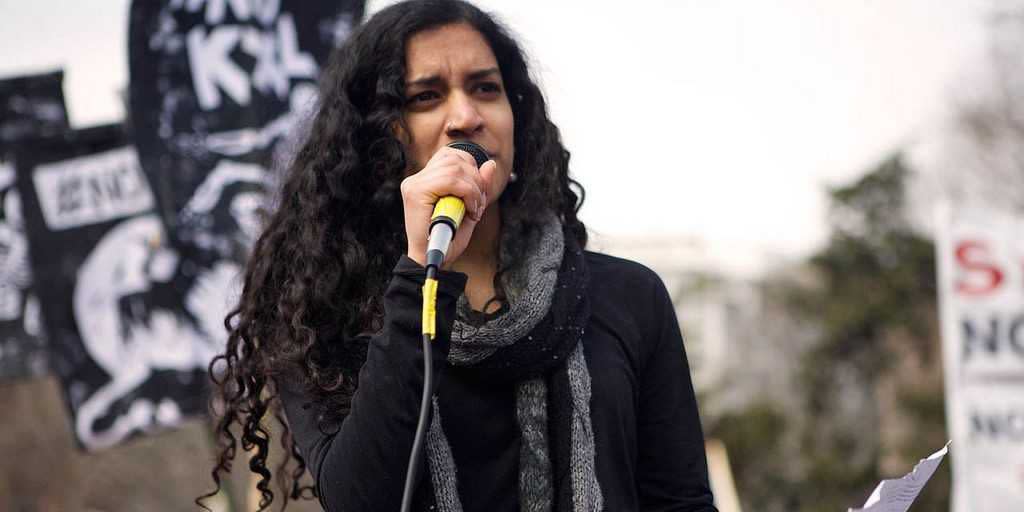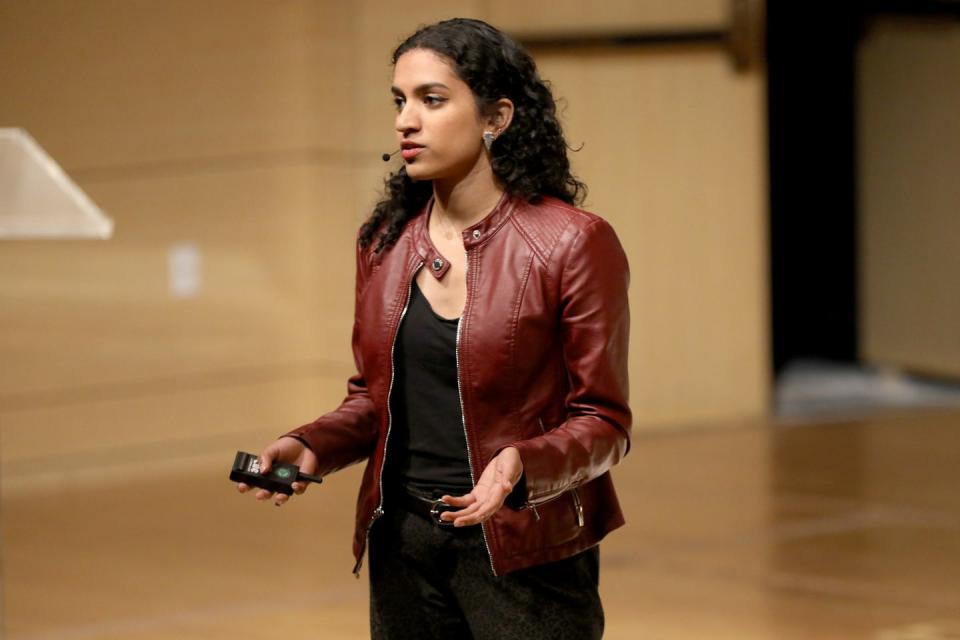How Varshini Prakash and the Sunrise Movement Are Making People Actually Care About Climate Change

Varshini Prakash does not have much time to slow down.
“It feels like every week is a week of action at this point for us,” Prakash, co-founder and executive director of the Sunrise Movement tells me, cheerfully, over the phone.
Earlier this month, Prakash, who is 25 years old, was Massachusetts Sen. Ed Markey’s guest for the State of the Union, which symbolized the meteoric ascent of the Sunrise Movement on the American political horizon.
This week, leaders of that organization – a youth grassroots movement that is driving the national conversation on climate change and the Green New Deal – are hosting what Prakash calls a Senate Sprint, where young people will encourage their Congressional representatives to sign onto the Green New Deal Resolution that was just introduced by Sen. Markey and Rep. Alexandria Ocasio-Cortez.
At the end of March, members of the Sunrise Movement will embark on a 15-city Green New Deal Tour to hold town halls in such states as Michigan, North Carolina, Pennsylvania, and Kentucky.
“We are going to activate the millions of Americans who are ready to fight for a Green New Deal, but haven’t heard of it yet,” she explains.
The Sunrise Movement thrust itself into the national spotlight after holding a 150-person sit-in to demand climate action in then-Minority Leader Pelosi’s office in November (which Rep. Ocasio-Cortez attended). They bolstered their position by using demonstrations and social media to push prominent Democrats to publicly support the concept of the Green New Deal.
Now, with formidable momentum, they’re turning their focus to vulnerable Republican Senators who are up for reelection in 2020.
“A lot of our work in the next couple of weeks is going to be having conversations to show that some of these vulnerable Republicans, their opinions and views on this Green New Deal resolution are actually wildly out of touch with what their own constituents believe and support,” Prakash explains.
Prakash was an organizer during her undergrad years at UMass Amherst, calling on the school to divest from fossil fuels (it became the first major public university to do so in 2016). After graduating, she went on to help coach other campaigns across the country, before cofounding the Sunrise Movement in 2017.
“We were all feeling pretty freaked out and scared and uneasy that we’d achieved a lot in our respective movement orbits, but it felt like disasters and floods and fires and storms were all getting bigger, and our movement wasn’t growing with it,” Prakash explains.
To understand how to best create an effective movement, they spent a year and a half in study before they officially launched.
“We studied historic and contemporary social movements, and how people had achieved the scale of transformation that we needed to solve climate crisis,” she says. “We talked to experts in the field and discussed the successes and failures of the climate movement.”
In the summer of 2017, they took all they’d learned and came out with a four-year strategy. The goal was creating a social movement by and for young people that could go to scale to address the magnitude of the climate crisis with the urgency that it merited.

A year ago, “The Green New Deal” – a policy plan that proponents say would create millions of jobs while investing in green infrastructure and shifting the US to using 100% renewable energy - was not a commonplace term in mainstream conversations.Today, it has become a litmus test for Democratic presidential candidates. Sen. Cory Booker, Sen. Kirsten Gillibrand, Sen. Kamala Harris, Sen. Amy Klobuchar, Sen. Bernie Sanders and Sen. Elizabeth Warren all co-sponsored the resolution Sen. Markey introduced in the Senate.
In a December poll, 81% of registered voters said they either “somewhat support” or “strongly support” the Green New Deal.Prakash chalks up much of the public eagerness for embracing this bold response to climate crisis to the frequency with which communities are being destroyed by fires, floods and storms.Yet she said what really sets the Green New Deal apart is that it also entails a massive socio-economic transformation of America, with its focus on creating millions of green jobs. It tackles what she calls “the twin crises of our time: inequality and climate change.”
With the Sunrise Movement being run and powered by young people, Prakash has a simple message for anyone who believes young people are apathetic or politically disengaged: “Don’t count us out!”
“Some of these politicians like AOC and Bernie Sanders have provided a blueprint for the Democratic party for what it takes to invigorate and excite a youth base,” she says. “It’s like why don’t you actually talk about the issues that impact our lives? And why don’t you actually purport bold policy solutions that are going to make a difference.”
Soon, the Green New Deal resolution, and the work of the Sunrise Movement, will face its first challenge on the Senate floor: Senate Majority Leader Mitch McConnell has said he plans to hold a vote.
“We’ll give everybody an opportunity to go on record and see how they feel about the Green New Deal,” McConnell said, suggesting that forcing Democrats to go on official record supporting this resolution will hurt them in the 2020 election.
Prakash doesn’t falter for a second when asked about this gambit: She is not concerned that McConnell’s ploy might undermine the work she and the other leaders of the Sunrise Movement have done to promote the Green New Deal.
“Mitch McConnell is making a huge misstep that’s only going to lead to Republicans losing in 2020,” Prakash says, reminding me of the high rates of approval for not just Democratic voters, but also Republican voters.
“What I think is going on here is his party, and him in particular as leader of it, have no plan for how to tackle inequality and climate change,” she said. “And because he has no plan, the only course of action he has is to torpedo anything that would actually provide meaningful solutions and policies for the American people.”
('You Might Also Like',)

